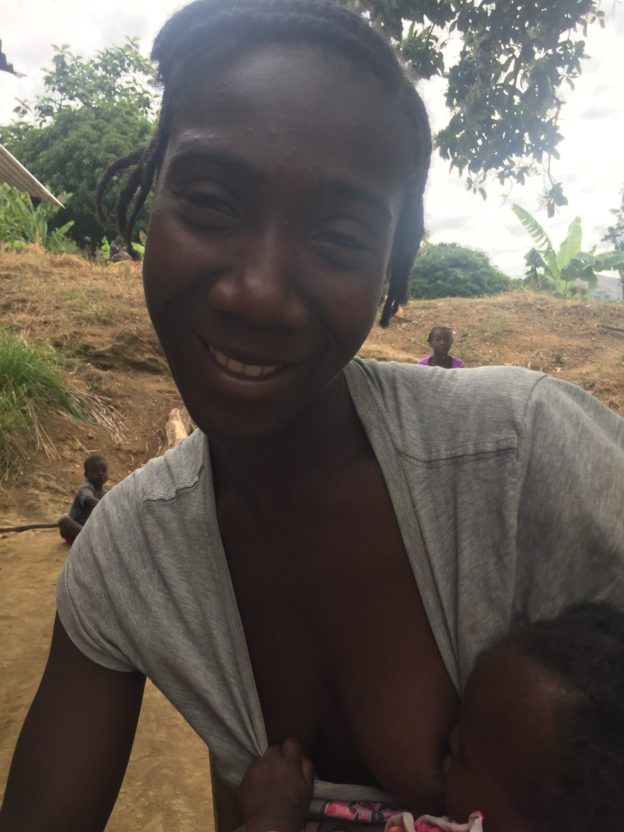Altagrace was happy with the way she passed her New Year’s holiday. “As long as we’re healthy, it’s always a good holiday.” And she likes the way her life is moving forward. “Now I have some of the things I’ve lacked in the past.”
Her goats are doing well. Though one miscarried its first pregnancy, the other is about to give birth. And even the one that miscarried seems to be pregnant again. Her boar is beginning to put on weight.
Keeping the latter is a challenge. She and her husband can find some of what it eats by scouring the area around their home. Leavings from the meals they prepare – like plantain peels – and various leaves and seeds that grow around them provide some of the pig’s diet. But it’s not enough. Altagrace has to buy feed as well, and it costs her about $2 a week, which is probably about half of what she spends on food for her family. It’s a big expense that puts pressure on her and her husband to keep cash coming into the household continually.
Her husband contributes with farm labor. She would be able to use her small commerce, but her first attempt at building one failed when she accepted 2,000 gourds – or about $30 – in counterfeit bills. So all she contributes now comes from her weekly stipend, which is less than a month from running out. “We split our expenses,” she explains, “between rice for the family and feed for the pigs.”
She says that she’d like to start another business, and she’s thought about businesses she could try. She thinks she has one basic choice to make. She can start buying produce in the mountains and transport it to market. That’s what her first business was. Or she can buy basic groceries – rice, oil, sugar, and the like – and sell them out of their home.
Each implies challenges. “If I try to buy and sell produce, I will have a lot of expenses because I don’t have an animal to carry them. It’s expensive to get them to market. If I sell things out of my home, I’ll need to have some extra capital because people can be slow to pay and if you don’t have money to buy merchandise with, the business will fail.”
But Altagrace says that she’s ready to get started, and she has enough money to do so in the savings account she keeps with her case manager. But right now, the case manager is reluctant to approve a withdrawal for her. Until CLM members graduate, withdrawal from savings requires a case manager’s authorization. Hers is Martinère, and he is concerned because her first business disappeared and when he approved another 1000-gourd withdrawal to get her moving again, she wasn’t able to show what she did with the money.
It may have gone towards building materials. In a sense, that would be ok. Altagrace and her husband are working on their home, and there are materials they’ll need to buy. But she should have told Martinière clearly if that was her plan. He had thought some of it might go towards sending their children, or some of them, to school, but Altagrace appears to be resigned to waiting until next year.
Martinière is worried that her husband is pressuring her to get access to the money she’s saved. He’s observed the way the two interact, and he’s concerned that Altagrace doesn’t know how to make decisions for herself. He plans to delay approval of the withdrawal – which he will almost certainly give eventually – until he has more confidence that Altagrace is speaking her own, and not her husband’s wishes.
In the meantime, Altagrace may be caught in the middle between two strong men. But at least she says she’s gotten comfortable talking with Martinière. “He’s working with me, thinking about what’s best for me. I can’t be afraid of talking things over with him.”
